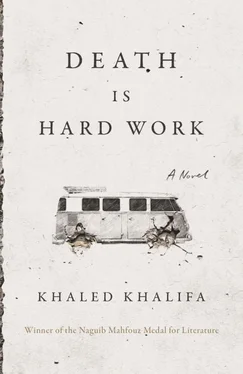His father spoke in a faltering voice about death and love, about the revolution and the martyrs, about the great future waiting for the children who had been born in these past four years and those who were yet unborn. An image of his wife returned to him, but he didn’t linger on it for long. He prayed for mercy on her soul in a few conventional phrases, just as people did before the war when a stranger’s funeral passed by. He elaborated on his relationship with his beloved Nevine. Bolbol understood this desire to narrate everything all over again, to reveal a side of himself that no one had known. Abdel Latif wanted to leave his final story in Bolbol’s hands—not only his final wish. Abdel Latif was increasingly cheerful as the day drew nearer when he would lie in Layla’s grave. He still missed her, in spite of everything, and was delighted whenever he heard the fantastic stories that star-crossed lovers wove around her, although they personally preferred to live loveless rather than die for their grand romantic dreams. These failed lovers, this host of ordinary men and women who had surrendered to the ways of this cruel earth, considered Layla their patron saint. They left roses on her neglected grave in secret, composed songs to her, and described her savage beauty with endless fascination.
Abdel Latif may have stopped mentioning the mother of his children, but nevertheless Bolbol recalled that his father had been assiduous in visiting her grave on holidays, as custom demanded. Still, the decades they had lived together were enough. Nevine compensated him for all his losses and had restored life to his soul and his body. The dead are more comfortable when they’re buried beside their loved ones; they speak to one another in a secret code impenetrable to the living. If it wasn’t for his sister Layla, and Nevine’s wish that Abdel Latif be far away from her when he died and was buried, he wouldn’t have asked to be interred in Anabiya. Nevine had refused to allow him to be buried in the same grave as her. How could he have found rest among the graves of her son and her husband, Najib Abdullah, his old friend? Several times he asked her to reconsider and allow him to stay close to her, as he wanted to die in her arms, but she wouldn’t discuss the matter. She wasn’t interested in surviving any more loved ones. She had no intention of being a custodian for any more graves.
Nevine had begun to believe that she would be around for many more years to come. This abundance of time dazed her. Nothing would satisfy her save going back to the land of her childhood. She wanted to cast off everything that might hamper her from flying freely away down that lengthy road lined with meadows… She liked to think that there she would go back to singing the sad songs of her childhood that befitted her two martyred sons; there she would be rid of her burdens, and everything superfluous would be shed. Men were plentiful everywhere; there was no use getting attached to one. Abdel Latif couldn’t change her mind, even as she moved in with him. The most wretched of creatures are those who are worshipped; what Nevine wanted was something far better: to be someone who worshipped and adored, not just another beloved worshipped by someone who adored her. She realized why she had always been miserable: she had never been a lover herself.
And so, Abdel Latif kept insisting that Bolbol be his audience during his last days. Bolbol alone knew about his father’s secret love; he imagined Hussein’s shocked expression when he discovered that the family home in S was to be split four ways instead of three—the only inheritance remaining to them.
One morning, Abdel Latif woke up early, eyes bright and face flushed. The previous night he had spoken to Nevine over a satellite phone belonging to a squadron commander he knew well. He’d beamed when he saw that there was an unknown number on the line, and he closed the door of his room behind him, emerging cheerfully a few minutes later to say that he would go to sleep early that night, after which he went right back into his room. This shyness struck Bolbol as rather peculiar, under the circumstances. In the morning, he found his father drinking coffee in the kitchen, and Bolbol’s cup was already waiting for him. His father surprised him by saying that if he’d lived much longer, he would have been nothing but the caretaker of the martyrs’ graveyard, which he had constructed himself. He cared for the plants and the flowers and the trees and listened to the raucous laughter of the departed martyrs every night. He spoke to them about their blood, which hadn’t been spilled in vain; he told them how the tyrant would soon depart, and children would go to school in clean clothes again, with heads held high and eyes filled with faith in their future. He spoke to Bolbol about martyrdom and revolution, confident in victory, and he didn’t want to hear any criticism. When Bolbol made his opinion clear, saying that the revolution was over and had become a civil war, and how the regime’s superior army would win in the end, his father made do with shaking his head and smoking voraciously without comment, ignoring what his son was telling him. Bolbol was irritated at being ignored and wanted to add that the international community—Russia, America, and all the West—was agreed that the regime should stay and that it would outlast this orphaned revolution, but Abdel Latif was done with the conversation, seeing how it would only corrupt his dreams. He didn’t want to be cruel to his son, but made it clear that he was here to talk and Bolbol here to listen, nothing more; in a few days he would be far away, and then Bolbol could go back to his opinions and his capitulation, could go on living in a neighborhood supporting the regime. He could dance to the sectarian songs broadcast by the speakers fixed above the houses where Hezbollah agents, who no longer hid their faces, gathered openly with National Defense troops—militias that the regime had recruited and armed, made up of volunteers, mostly regime supporters and Iraqi Shiʿites. Most members of these militias were unemployed or had criminal records, and no restraint was placed on their capacity to insult, arrest, and murder at will. They inspired terror even in fellow loyalists.
When Bolbol passed them, he greeted them as cheerily as he could manage; he tried to smile and never let his voice falter in calling out to them. His father, on the other hand, once spat on the ground in a clear show of defiance and said to Bolbol, “These traitors and invaders should all drop dead.” Bolbol tried to hurry their pace. He begged his father to stop his puerile behavior. Militias like these could kill anyone without having to answer for it. He told his father a dozen stories about what they had done to people, especially families who were sympathetic to the revolution. For instance, they burned down a family’s house when they discovered the son had been arrested at a checkpoint for smuggling medicine into the areas of Homs still under siege. On another occasion they kidnapped a girl from a neighboring district who died after being raped continuously for four days, and her family was forced to officially declare that she had died in a road accident if they wanted to get her body back. The neighbors stayed silent; deep down, many approved of the punishment her family had received. No one came to mourn with the girl’s family after her body was thrown into their living room, wounds still fresh. The family couldn’t bear to stay and left for Argentina to join distant relatives of the girl’s father. As for the father himself, he refused to leave the country before getting revenge on his daughter’s murderers, whom he knew by name. He returned to his hometown near Homs and shut himself away there, waiting for the moment when he could point a gun in the faces of the murderers. He hung a list of their names on his wall.
Читать дальше












